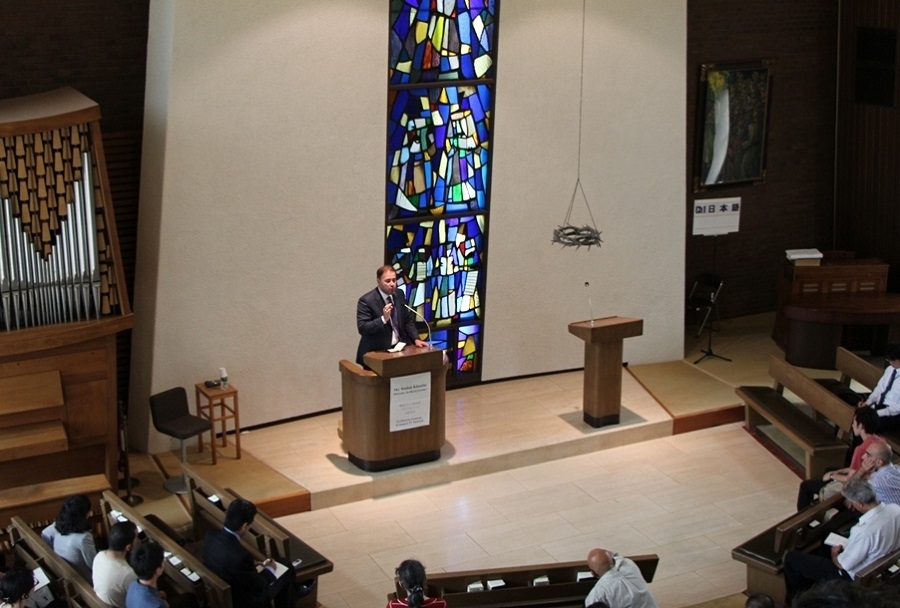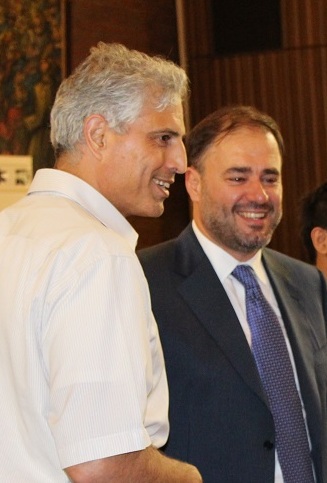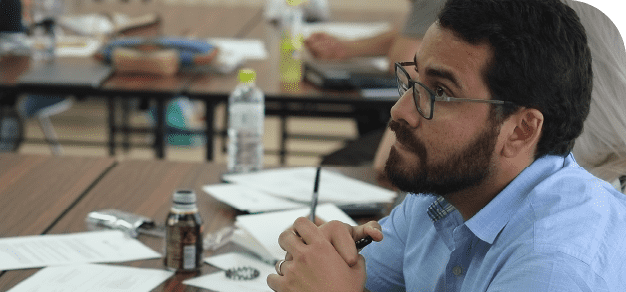GRM Students’ Reports
GRM履修生活動レポート
Summery of Public Lecture of Wadah Khanfar, Ex Al-Jazeera TV Network
Graduate School of Global Studies Iyas Salim
2013/06/08
Date: June 8 (Sat), 2013
Venue: Divinity Hall Chapel, Imadegawa Campus
Theme: "Arab Spring and the Democratization Process in the Middle Eastern Countries"
Lecturer: Mr. Wadah Aref A Khanfar (Former Director General of Al Jazeera TV Network)
*********************************************
The roots of the present situation in the Arab World go back to the consequences of the First World War. The two Imperial Powers of Britain and France divided the Arab World into twenty two states, under the Sykes-Picot treaty of May 1916. The dividing borders did have any meaningful significance to the identity of the people. The borders are artificial. However, the nation-state was born and the new nationalist Arab regimes deepened the border divisions in order to strengthen their grip on power.
The Arab states are geographically located in African and Asian sides, making up the Arab World as we know it. After the Arab Spring, it seems that the African side of Arab world, North Africa, more promising that the Arab states in the Asian side. Sectarian violence is threatening the Asian Arab side. It is the kind of conflict, Sectarian conflict, which no winner would emerge out of it. All parties who participate in sectarian conflict would lose, if not finish each other.
This development is actually contrary to the reality of history of, the Asian side of the Arab World, known as the Mashreq region the so called Fertile Crescent, Al- Hilal Al-Khasib, stretches from Basra in South of Iraq to the West to Beirut, on the Mediterranean Sea. This region is considered one of the world’s ancient cradles of civilizations. In it, diverse people have settled and lived with diverse religions and ethnicities for thousands of years. In fact, you still find old Christian communities who use the same spoken language during the time of Jesus Christ. Such co-existence continued to thrive for centuries.
The Syrian conflict is threatening this existence. The modern state in Syria is controlled by the Alwite minority of the country. The majority of the population of the country is Sunni Muslims who have always been the power base since the birth of Islam, fourteen centuries ago. The ongoing conflict in Syria has nothing in it Syrian but the people who get killed everyday. The whole world is interfering in Syria; worsening the situation and making it hard to solve. It is the people of Syria who are paying the heaviest price. And if the world can not end the conflict and solve it, it means the Syrian crisis will reflect on the whole world in one way or another.
Egypt has many internal divisions; however Egypt has always been a state in a long history. The country is experiencing political strife but it is a good experience for the Egyptian people to come to grip with learning about political life under the new freedom. Egyptian politics is posed to mature and it will take some time. Egypt will make it and will be able to stand firm on its feet in the foreseeable future.
Israeli think tanks came up first with idea about the fragmentation of Arab countries along sectarian lines. They were the first to talk about it and envision its future scenario. That would help Israel position itself in the area to project itself as another state among other small sectarian countries, instead of facing big Arab states. However, that does not mean it is all good news for Israel. The current situation is different from before when Israel would only pick the phone and talk with its friend former president of Egypt Mubarak. Also, the Syrian regime protected the Syrian-Israeli border for more than four decades. The Syrian crisis is worrying Israel and could threaten the border region.
A new Sykes-Picot treaty seems to be in the working. It is a new vision for the Middle East where the already divided states are threatened to be more divided along sectarian lines. Currently, it is possible to talk about a new political map being drawn. Traditionally, there are three nations that make up the Middle East; the Arabs, Turkey and Iran. Turkey is a state with a vision and a strategy. Iran is also a state with its own strategy. But, the Arabs do not have their say and strategy at the present time. There used to be three main Arab state that influence Arab politics at large scale; Iraq, Syria and Egypt. Iraq is destroyed as a state. Syrian is being destroyed. Egypt is facing internal political conflict and needs few years to stand on its own.
Turkey’s strategy is to create an economic free zone in the Hilal Al-Khasib, Fertile Crescent. They aim is to create an economic zone with the Arab world that could lead to an economic development and democratization. Turkey wants to the keep the region unified and intact. That depends on the outcome of the war in Syria. Iran, as elaborated by an Iranian leader who spoke directly to Mr. Khanfar, wants to dominate the Fertile Crescent from Basra to Beirut. Right now, Iran does control Iraq, Syria and Lebanon. The Syrian regime is allied with Iran. Hezbollah is the strongest military force inside Lebanon. If the area of the Fertile Crescent remains under the influence of Iran, Iran wants to keep it intact and unified. But, if the Syrian regime loses the war, Iran is going to divide Iraq and keep the Shiite section of Iraq as a state allied with Iran.
Detail of Global Leadership Forum




